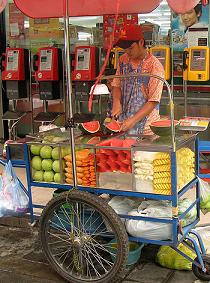The Associated Press reports that a survey of fruit available via ubiquitous street carts in Thailand’s capital, Bangkok, found unsafe levels of bacteria and chemicals that help keep it looking fresh in the city’s tropical heat.
The Prime Minister’s Office launched a one-month campaign Monday to encourage fruit vendors and their suppliers to improve hygiene and provide  consumers with safe, clean fruit. Authorities warned another survey will be taken at the end of the month after which vendors selling contaminated fruit will face up to two years in prison and fines of 20,000 baht ($650).
consumers with safe, clean fruit. Authorities warned another survey will be taken at the end of the month after which vendors selling contaminated fruit will face up to two years in prison and fines of 20,000 baht ($650).
The study conducted throughout August by Bangkok City Hall, the Thai Food and Drug Administration and other health agencies sampled fruit from 38 vendors across the capital, where baggies packed with watermelon or pineapple sell for 10 baht (30 cents) and pricier guava costs 25 baht (80 cents).
Results of the study found that 67 percent of 153 samples of fresh fruit contained unsafe amounts of coliform bacteria. Coliform bacteria is common in digestive tracts and does not necessarily cause sickness, but its presence may indicate fecal matter, E. coli and other disease-causing organisms.
